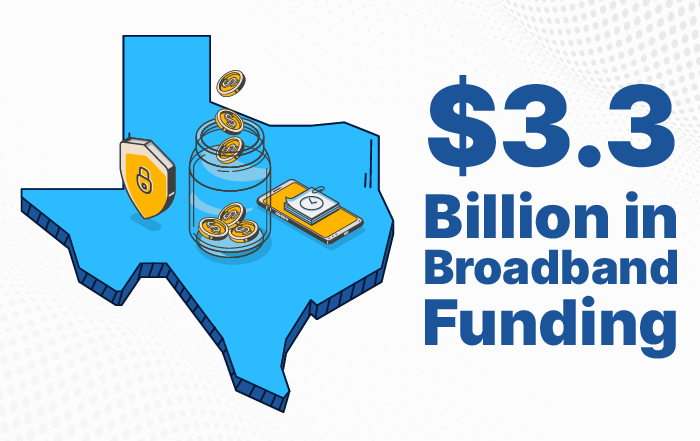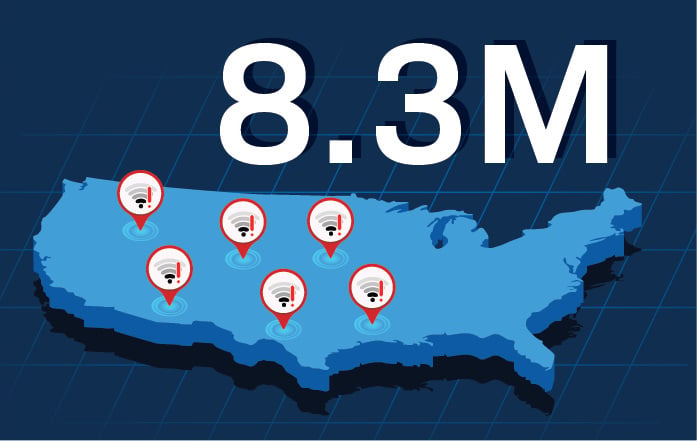Texas Secures Over $3.3 Billion in Broadband Funding
In a significant move to address the digital divide, Texas is set to receive a substantial investment of over $3.3 billion from the federal...

The Rural Digital Opportunity Fund (RDOF) program, launched by the Federal Communications Commission (FCC), holds the promise of extending high-speed internet access to underserved rural areas. However, recent developments reveal that not all recipients of the RDOF grants are living up to their commitments. This blog examines the FCC’s decision to propose fines totaling over $8 million against 22 RDOF applicants for defaults and its implications for the future of broadband expansion.
The RDOF program was established with the aim of bringing broadband connectivity to areas that have historically lacked access due to geographic and economic challenges. Through a reverse auction mechanism, ISPs were awarded grants to build out infrastructure and provide high-speed internet services to these underserved regions. The program garnered attention for its potential to transform the lives of millions by granting them access to educational resources, job opportunities, healthcare services, and more.
Despite the promise of RDOF, recent revelations indicate that some recipients are failing to fulfill their obligations. The FCC’s decision to propose fines exceeding $8 million against 22 RDOF applicants sends a strong message: commitment to the expansion of broadband services is non-negotiable. These fines come as a response to the applicants’ alleged defaults on their RDOF obligations, which raises concerns about the integrity of the program and the urgency of holding grant recipients accountable.
The proposed fines are not merely punitive measures; they symbolize the FCC’s commitment to ensuring that the RDOF program serves its intended purpose. Accountability is essential to maintaining the integrity of such initiatives, and holding defaulting applicants responsible for their commitments is a step in the right direction. Moreover, these fines serve as a deterrent against future defaults, sending a message to all grant recipients that their promises to expand broadband access must be upheld.
The situation also offers valuable lessons for the design and execution of future broadband expansion programs. Ensuring stringent evaluation of applicants, setting clear and achievable targets, and establishing regular progress reporting mechanisms can help prevent defaults and ensure that public funds are used effectively. Moreover, enhancing transparency and public involvement in monitoring the progress of these projects can create a sense of shared responsibility and encourage active community engagement.
The RDOF program represents an opportunity to uplift underserved rural communities, offering them a chance to partake in the digital revolution. The proposed fines against defaulting applicants reinforce the idea that the pursuit of equitable access to high-speed internet is a collective responsibility. Empowering these communities with connectivity not only enhances their quality of life but also contributes to national progress.
Final Thoughts
The FCC’s decision to propose fines exceeding $8 million against 22 RDOF applicants for defaults serves as a reminder that promises made in the pursuit of equitable broadband access must be upheld. As the world becomes increasingly interconnected, ensuring that no one is left behind in the digital age is crucial. By holding grant recipients accountable, refining program design, and promoting transparency, we can create a future where reliable high-speed internet access is a reality for all, contributing to a more inclusive and empowered society.

In a significant move to address the digital divide, Texas is set to receive a substantial investment of over $3.3 billion from the federal...

Access to reliable and high-speed internet has become an essential requirement for individuals, communities, and businesses in the 21st century....

The Federal Communications Commission (FCC) has released an updated national broadband access map, highlighting the ongoing issue of over 8.3...